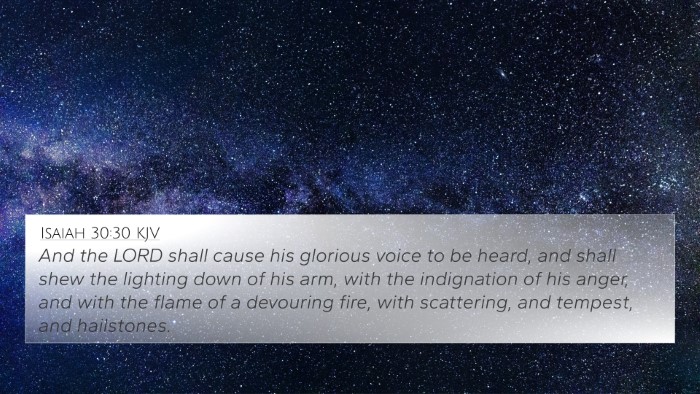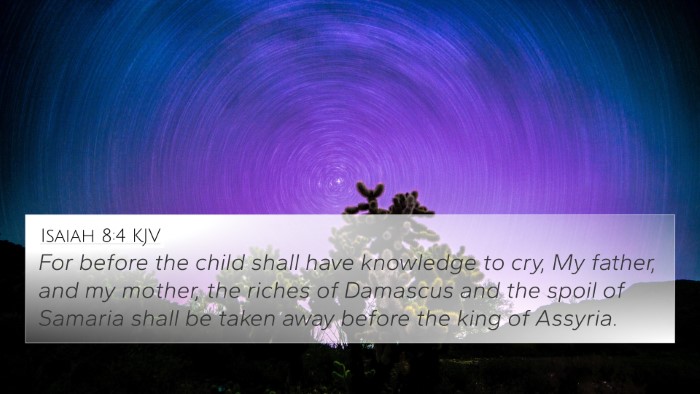Understanding Isaiah 10:5
Isaiah 10:5 reads: “O Assyrian, the rod of my anger, and the staff in their hand is mine indignation.” This verse presents God’s perspective on the Assyrian empire and its role in His plan for judgment against Israel. The meaning of this verse can be explored through various public domain commentaries, which offer valuable insights.
Contextual Analysis
The book of Isaiah addresses the people of Israel during a time of impending judgment and deliverance. This specific verse highlights the use of Assyria as an instrument of divine wrath. It is pivotal in understanding the theological implications of God employing nations to fulfill His purposes.
Commentary Insights
- Matthew Henry: Henry emphasizes that the Assyrians are depicted not merely as a nation but as a tool of God’s anger. He reflects on the sovereignty of God, asserting that He is in control of all nations and uses them according to His will.
- Albert Barnes: Barnes explores the historical context, suggesting that this verse underscores the chastisement of Israel by a powerful enemy as a means of correction. He posits that God's indignation is not without a purpose, aiming to bring His people back to Him.
- Adam Clarke: Clarke notes the paradox of God using an ungodly nation to enact judgment. He brings attention to the idea that the Assyrian king was unaware that he was fulfilling God's design, which serves as a reminder of God’s control over human actions.
Thematic Connections
This verse connects with several biblical themes including divine sovereignty, judgment, and redemption. To fully appreciate this verse, one can look at how it relates to other scripture passages.
Bible Verse Cross-References
Here are some essential Bible verses that relate to Isaiah 10:5, showcasing connections between Bible verses:
- Isaiah 9:4 - “For the yoke of his burden, and the staff of his shoulder, the rod of his oppressor, you have broken…”
- Isaiah 45:7 - “I form the light, and create darkness: I make peace, and create evil: I the Lord do all these things.”
- Jeremiah 25:9 - “Behold, I will send and take all the families of the north, saith the Lord, and Nebuchadnezzar the king of Babylon, my servant…”
- Romans 9:17 - “For the scripture saith unto Pharaoh, Even for this same purpose have I raised thee up, that I might show my power in thee…”
- Habakkuk 1:6 - “For, lo, I raise up the Chaldeans, that bitter and hasty nation…”
- 2 Kings 18:13 - “Now in the fourteenth year of king Hezekiah did Sennacherib king of Assyria come up against all the fenced cities of Judah, and took them.”
- Psalms 76:10 - “Surely the wrath of man shall praise thee: the remainder of wrath shalt thou restrain.”
Inter-Biblical Dialogue
The prophetic literature often demonstrates how God uses various means to bring about His purposes. Isaiah 10:5 serves as a poignant reminder of this principle. Examining cross-referencing between the Old and New Testament reveals a broader narrative regarding God’s righteousness and judgment.
Connecting Old and New Testament
This theme of God using rulers and nations for His purposes continues in the New Testament. The apostle Paul acknowledges God's sovereignty in Romans, implying that even leaders are under God's authority.
Cross-Referencing Insights
Tools for Bible cross-referencing offer a comprehensive way to uncover deeper meanings. Here are several tools you might find useful:
- Bible concordance
- Bible cross-reference guide
- Cross-reference Bible study methods
- Bible reference resources
Interpretation for Today
For contemporary readers, Isaiah 10:5 serves as a powerful reminder of God’s overarching control and purpose in the midst of chaos. It challenges believers to trust in God's plan, even when circumstances might suggest otherwise. The intricate design of scripture, with its thematic Bible verse connections, enhances our understanding of God’s judgment and mercy.
Understanding the connections between these verses through comparative Bible verse analysis can enrich faith and promote spiritual growth.














